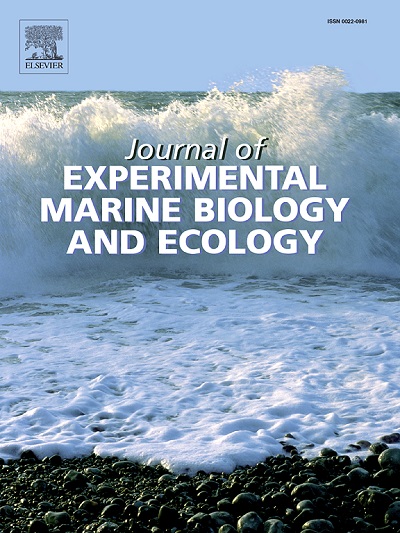气候变化的影响:温度和盐度对巴西海星早期发育的影响
IF 1.8
3区 生物学
Q3 ECOLOGY
Journal of Experimental Marine Biology and Ecology
Pub Date : 2025-05-26
DOI:10.1016/j.jembe.2025.152110
引用次数: 0
摘要
海星在海洋群落的营养网中起着至关重要的生态作用,是生态系统健康状况的良好指标。巴西海星栖息在西南大西洋的浅水区,范围从巴西南部到阿根廷北部,由于水族馆贸易的过度开采,它曾面临威胁。本研究通过模拟全球气候变化情景,研究了高温(27°C和31°C)和低盐度(30°C和26°C)对巴西月蛾(e.o . brasiliensis)胚胎和幼虫的影响。我们的研究结果表明,升高的温度不仅加速了幼虫的发育,而且导致了死亡率和畸形发生率的增加。与此同时,盐度的降低延缓了胚胎的发育。这些结果表明,不断变化的环境条件可能会损害巴西芽孢杆菌种群的生存能力,强调了保护该物种和其他具有相似生殖性状的物种的必要性。本文章由计算机程序翻译,如有差异,请以英文原文为准。
Effects of climate change: Temperature and salinity impacts on the early development of the sea star Echinaster (Othilia) brasiliensis
Sea stars play crucial ecological roles in the trophic web of marine communities and are good indicators of the ecosystem's health. The sea star Echinaster (Othilia) brasiliensis inhabits the shallow waters of the southwestern Atlantic, ranging from southern Brazil to northern Argentina, and once faced a threat due to overexploitation for the aquarium trade. In this study, we investigated the impact of high temperatures (27 °C and 31 °C) on embryos and low salinities (30 and 26) on larvae of E. (O.) brasiliensis, simulating conditions predicted under global climate change scenarios. Our findings reveal that elevated temperatures not only accelerated larval development but also led to increased mortality and incidence of malformations. Meanwhile, reduced salinities delayed embryo development. These results suggest that changing environmental conditions may compromise the viability of E. (O.) brasiliensis populations, emphasizing the need for conservation efforts to safeguard this species and others with similar reproductive traits.
求助全文
通过发布文献求助,成功后即可免费获取论文全文。
去求助
来源期刊
CiteScore
4.30
自引率
0.00%
发文量
98
审稿时长
14 weeks
期刊介绍:
The Journal of Experimental Marine Biology and Ecology provides a forum for experimental ecological research on marine organisms in relation to their environment. Topic areas include studies that focus on biochemistry, physiology, behavior, genetics, and ecological theory. The main emphasis of the Journal lies in hypothesis driven experimental work, both from the laboratory and the field. Natural experiments or descriptive studies that elucidate fundamental ecological processes are welcome. Submissions should have a broad ecological framework beyond the specific study organism or geographic region.
Short communications that highlight emerging issues and exciting discoveries within five printed pages will receive a rapid turnaround. Papers describing important new analytical, computational, experimental and theoretical techniques and methods are encouraged and will be highlighted as Methodological Advances. We welcome proposals for Review Papers synthesizing a specific field within marine ecology. Finally, the journal aims to publish Special Issues at regular intervals synthesizing a particular field of marine science. All printed papers undergo a peer review process before being accepted and will receive a first decision within three months.

 求助内容:
求助内容: 应助结果提醒方式:
应助结果提醒方式:


